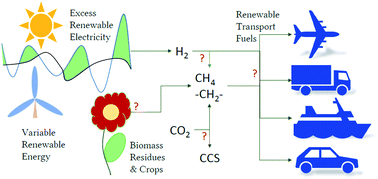Electrofuels from excess renewable electricity at high variable renewable shares: cost, greenhouse gas abatement, carbon use and competition†
Abstract
Increasing shares of variable renewable electricity (VRE) generation are necessary for achieving high renewable shares in all energy sectors. This results in increased excess renewable electricity (ERE) at times when supply exceeds demand. ERE can be utilized as a low-emission energy source for sector coupling through hydrogen production via electrolysis, which can be used directly or combined with a carbon source to produce electrofuels. Such fuels are crucial for the transport sector, where renewable alternatives are scarce. However, while ERE increases with raising VRE shares, carbon emissions decrease and may become a limited resource with several usage options, including carbon storage (CCS). Here we perform a model based analysis for the German case until 2050, with a general analysis for regions with a high VRE reliance. Results indicate that ERE-based electrofuels could achieve a greenhouse gas (GHG) abatement of 74 MtCO2eq yearly (46% of current German transport emissions) by displacing fossil fuels, at high fuel-cell electric vehicle (FCEV) shares, at a cost of 250–320 € per tCO2eq. The capital expenditure of electrolysers was found not to be crucial for the cost, despite low capacity factors due to variable ERE patterns. Carbon will likely become a limiting factor when aiming for stringent climate targets and renewable electricity-based hydrocarbon electrofuels replacing fossil fuels achieve up to 70% more GHG abatement than CCS. Given (1) an unsaturated demand for renewable hydrocarbon fuels, (2) a saturated renewable hydrogen demand and (3) unused ERE capacities which would otherwise be curtailed, we find that carbon is better used for renewable fuel production than being stored in terms of overall GHG abatement.



 Please wait while we load your content...
Please wait while we load your content...